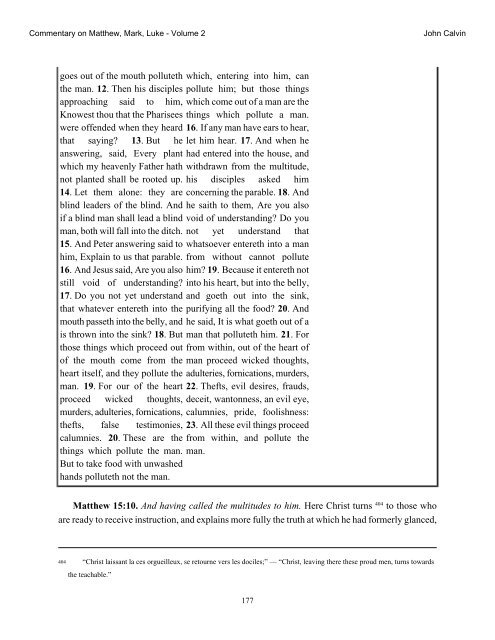Commentary on Matthew, Mark, Luke - Volume 2.pdf
Commentary on Matthew, Mark, Luke - Volume 2.pdf Commentary on Matthew, Mark, Luke - Volume 2.pdf
- Page 131 and 132: Commentary on Matt
- Page 133 and 134: Commentary on Matt
- Page 135 and 136: Commentary on Matt
- Page 137 and 138: Commentary on Matt
- Page 139 and 140: Commentary on Matt
- Page 141 and 142: Commentary on Matt
- Page 143 and 144: Commentary on Matt
- Page 145 and 146: Commentary on Matt
- Page 147 and 148: Commentary on Matt
- Page 149 and 150: Commentary on Matt
- Page 151 and 152: Commentary on Matt
- Page 153 and 154: Commentary on Matt
- Page 155 and 156: Commentary on Matt
- Page 157 and 158: Commentary on Matt
- Page 159 and 160: Commentary on Matt
- Page 161 and 162: Commentary on Matt
- Page 163 and 164: Commentary on Matt
- Page 165 and 166: Commentary on Matt
- Page 167 and 168: Commentary on Matt
- Page 169 and 170: Commentary on Matt
- Page 171 and 172: Commentary on Matt
- Page 173 and 174: Commentary on Matt
- Page 175 and 176: Commentary on Matt
- Page 177 and 178: Commentary on Matt
- Page 179 and 180: Commentary on Matt
- Page 181: Commentary on Matt
- Page 185 and 186: Commentary on Matt
- Page 187 and 188: Commentary on Matt
- Page 189 and 190: Commentary on Matt
- Page 191 and 192: Commentary on Matt
- Page 193 and 194: Commentary on Matt
- Page 195 and 196: Commentary on Matt
- Page 197 and 198: Commentary on Matt
- Page 199 and 200: Commentary on Matt
- Page 201 and 202: Commentary on Matt
- Page 203 and 204: Commentary on Matt
- Page 205 and 206: Commentary on Matt
- Page 207 and 208: Commentary on Matt
- Page 209 and 210: Commentary on Matt
- Page 211 and 212: Commentary on Matt
- Page 213 and 214: Commentary on Matt
- Page 215 and 216: Commentary on Matt
- Page 217 and 218: Commentary on Matt
- Page 219 and 220: Commentary on Matt
- Page 221 and 222: Commentary on Matt
- Page 223 and 224: Commentary on Matt
- Page 225 and 226: Commentary on Matt
- Page 227 and 228: Commentary on Matt
- Page 229 and 230: Commentary on Matt
- Page 231 and 232: Commentary on Matt
<str<strong>on</strong>g>Commentary</str<strong>on</strong>g> <strong>on</strong> <strong>Matthew</strong>, <strong>Mark</strong>, <strong>Luke</strong> - <strong>Volume</strong> 2<br />
goes out of the mouth polluteth which, entering into him, can<br />
the man. 12. Then his disciples pollute him; but those things<br />
approaching said to him, which come out of a man are the<br />
Knowest thou that the Pharisees things which pollute a man.<br />
were offended when they heard 16. If any man have ears to hear,<br />
that saying? 13. But he let him hear. 17. And when he<br />
answering, said, Every plant had entered into the house, and<br />
which my heavenly Father hath withdrawn from the multitude,<br />
not planted shall be rooted up. his disciples asked him<br />
14. Let them al<strong>on</strong>e: they are c<strong>on</strong>cerning the parable. 18. And<br />
blind leaders of the blind. And he saith to them, Are you also<br />
if a blind man shall lead a blind void of understanding? Do you<br />
man, both will fall into the ditch. not yet understand that<br />
15. And Peter answering said to whatsoever entereth into a man<br />
him, Explain to us that parable. from without cannot pollute<br />
16. And Jesus said, Are you also him? 19. Because it entereth not<br />
still void of understanding? into his heart, but into the belly,<br />
17. Do you not yet understand and goeth out into the sink,<br />
that whatever entereth into the purifying all the food? 20. And<br />
mouth passeth into the belly, and he said, It is what goeth out of a<br />
is thrown into the sink? 18. But man that polluteth him. 21. For<br />
those things which proceed out from within, out of the heart of<br />
of the mouth come from the man proceed wicked thoughts,<br />
heart itself, and they pollute the adulteries, fornicati<strong>on</strong>s, murders,<br />
man. 19. For our of the heart 22. Thefts, evil desires, frauds,<br />
proceed wicked thoughts, deceit, want<strong>on</strong>ness, an evil eye,<br />
murders, adulteries, fornicati<strong>on</strong>s, calumnies, pride, foolishness:<br />
thefts, false testim<strong>on</strong>ies, 23. All these evil things proceed<br />
calumnies. 20. These are the from within, and pollute the<br />
things which pollute the man. man.<br />
But to take food with unwashed<br />
hands polluteth not the man.<br />
<strong>Matthew</strong> 15:10. And having called the multitudes to him. Here Christ turns 404 to those who<br />
are ready to receive instructi<strong>on</strong>, and explains more fully the truth at which he had formerly glanced,<br />
404 “Christ laissant la ces orgueilleux, se retourne vers les dociles;” — “Christ, leaving there these proud men, turns towards<br />
the teachable.”<br />
177<br />
John Calvin



